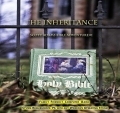The Inheritance
First posted on 01 July 2015. Last updated on 01 July 2015.

|
| The Inheritance is the first game in the Scott Adams Bible Adventure series. |
The Inheritance Retail Package
The Retail Package includes a shipped packaged version of the game in addition to the digital download.
The Inheritance Limited Gold Package
The Limited Gold Package includes an autographed copy of the shipped packaged version of the game in addition to the digital download, a special autographed memorabilia, and a copy of the Return To Pirates Island 2.
The Inheritance (also known as The Inheritance: Scott Adams Bible Adventure #1) is the first game from famed text adventure designer Scott Adams after a hiatus of more than a decade. Adams cofounded Adventure International in 1978 and rose to prominence at the dawn of the home computer era in the late 1970s and early 1980s, when text adventure games released by the developer such as Adventureland, Pirate Mission, and The Count dominated the computer game market. The company later expanded into illustrated adventures, most notably with the Questprobe series featuring characters from Marvel comics. With The Inheritance, Adams has decidedly returned to his text adventure roots, creating a new game engine that incorporates sound effects, automatic game saves, and an in-game hint system. While fans of Adams may enjoy this work, modern text adventure gamers probably find themselves struggling with the game's rather crude parser. Text parsers have come a long way since the days of Adventure International, and the parser used in The Inheritance simply does not reflect the current standards in interactive fiction. Likewise, the heavy emphasis on the bible may turn off some gamers who are not Christians. In short, I recommend this game only to text adventure fans who do not mind dealing with a questionable parser or reading bible verses to find solutions for puzzles in a game.
The game begins in a hotel room, where the player character (who is gender neutral) has just arrived to investigate a mysterious estate he or she has received in the last will and testament of Peabody Fogborne. The player is also accompanied by the invisible "Butler Jeeves", a sort of guardian spirit who occasionally talks to the player and prevents the player from doing certain actions (like stealing). Eventually, the player is allowed to visit the mansion, where a variety of bible related challenges await.
The problems with the game become evident early on. An alarm clock is ringing in the room, and there is no obvious way to turn it off. The eventual solution, which will probably require using the in-game help to get hints or an outright solution, may be humorous to some, though most will likely find it frustrating. As with Adams' classic text adventures, most players will spend the majority of the time typing every conceivable phrasing and word combination until they stumble upon the precise solution required to advance the plot. Even maddeningly simple tasks like taking a nap become extraordinarily complex, requiring a punishing sequence of mundane tasks that must be completed exactly to move forward. While the writing is often quite humorous and witty, the puzzles are simply too counterintuitive or convoluted to be much fun. Some aspects of the game seem designed simply to infuriate the player. For example, in the early part of the game, the player character can only carry a precious few items. To get around this limit, the player must constantly drop some items, pick up other items, and then backtrack. Meanwhile, the player can easily catch cold by being rained on, which necessitates a laborious, multistep process to remedy.
Thankfully, the game includes a handy in-game hint system that keeps the player on the right path. Typing simply "help" will give basic information and suggest an area or puzzle that the player needs to tackle next to advance the plot. Typing "help on" followed by an item name will provide more direct guidance. If the player is still stumped, typing "more help on" and finally "solution on" will spell out the next step. I must confess that, while I am not a novice to this type of game, I too have found myself using the hint system repeatedly to make any substantive progress.
The game features sound effects, including the occasional dialog from the butler. They are well done for the most part, though it eventually becomes irritating to hear the same sounds over and over again with no option to skip over them. At a particular point in the game, the player must type "laugh". The ensuing sound effect seems to go forever, interrupting the gameplay considerably. Fortunately, there is an option to disable sound effects completely in the game.
Modern interactive fiction games are frequently praised for clever writing and imaginative storytelling. Sadly, the writing in The Inheritance is, at best, functional, with few flourishes or evocative descriptions. A good example is the opening room—a "nondescript cheap motel room" that seems "pretty plain". Most other items are described simply as "standard", such as "standard bathroom shower". Looking at these items often just yields a generic response, such as "I see nothing special."
Compared to modern interaction fiction, it is hard to overlook the crude parser, infuriating puzzles, and sparse textual descriptions used in The Inheritance. I recommend this game only to fans of Adams' early text adventures, who may enjoy it for mere nostalgia.
